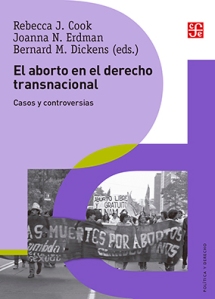Congratulations to Ebenezer Durojaye, Gladys Mirugi-Mukundi, and Charles Ngwena, whose co-edited book, was recently published by Routledge. Ebenezer Durojaye is Professor and Head of the Socio-Economic Rights Project at the Dullah Omar Institute, University of the Western Cape, South Africa; Gladys Mirugi-Mukundi is a researcher in the same project; and Charles Ngwena is Professor of Law, Center for Human Rights, University of Pretoria. We are pleased to circulate the abstract and Table of Contents of this open-access book, showing the wide range of authors and subjects covered.
Ebenezer Durojaye, Gladys Mirugi-Mukundi and Charles Ngwena, eds., Advancing Sexual and Reproductive Health and Rights in Africa: Constraints and Opportunities (Routledge, 2021), 268 pages. Entire book is online and downloadable.
This book explores recent developments, constraints and opportunities relating to the advancement of sexual and reproductive health and rights in Africa.
Despite many positive developments in relation to sexual and reproductive health in recent years, many Africans still encounter challenges, for instance in poor maternity services, living with HIV, and discrimination on the basis of age, gender, sexual orientation or identity. Covering topics such as abortion, gender identity, adolescent sexuality and homosexuality, the chapters in this book discuss the impact of culture, morality and social beliefs on the enjoyment of sexual and reproductive health and rights across the continent, particularly in relation to vulnerable and marginalized groups. The book also explores the role of litigation, national human rights institutions and regional human rights bodies in advancing the realization of sexual and reproductive health and rights in the region. Throughout, the contributions highlight the relevance of a rights-based framework in addressing topical and contentious issues on sexual and reproductive health and rights within Sub-Saharan Africa. This book will therefore be of interest to researchers of sexuality, civil rights and health in Africa.
The Open Access version of this book, available online here, has been made available under a Creative Commons Attribution-Non Commercial-No Derivatives 4.0 license.
Table of Contents
1. Introduction
Ebenezer Durojaye, Gladys Mirugi-Mukundi and Charles Ngwena
2. Abortion and ‘conscientious objection’ in South Africa: The need for regulation
Satang Nabaneh
3. Addressing Maternal Mortality through decriminalizing abortion in Nigeria: Asking the “Woman Question”
Ibrahim Obadina
4. Mainstreaming the ‘Abortion Question’ into the Right to Health in Uganda
Robert Nanima
5. Barriers to Access to Contraceptives for Adolescent Girls in Rural Zimbabwe as a Human Rights Challenge
Michelle Rufaro Maziwisa
6. It Takes Two to Tango! – The Relevance and Dilemma of Involving Men in the Realisation of Sexual and Reproductive Health and Rights in Africa
Sibusiso Mkwananzi
7. Positive Approaches to Childhood Sexuality and Transforming Gender Norms in Malawi
Godfrey Dalitso Kangaude
8. Addressing Female Genital Cutting/Mutilation (FGC/M) in The Gambia: Beyond Criminalisation
Ebenezer Durojaye and Satang Nabaneh
9. In Search of a Middle Ground: Addressing Cultural and Religious Influences on the Criminalisation of Homosexuality in Nigeria
Adetoun T Adebanjo
10. A Case for Removing Barriers to Legal Recognition of Transgender Persons in Botswana
Kutlwano Pearl Magashula
11. Advancing the Rights of Sexual and Gender Minorities under the African Charter on Human and Peoples’ Rights: The Journey to Resolution 275
Berry D. Nibogora
12. Lessons from Litigating for Sexual and Reproductive Health Rights in Southern Africa
Tambudzai Gonese-Manjonjo and Ebenezer Durojaye
13. Experiences from the Kenya National Commission on Human Rights KNCHR) on the Promotion and Protection of Sexual and Reproductive Health and Rights
Shatikha S. Chivusia
14. Monitoring implementation of the sexual and reproductive health and rights of adolescent children: the role of the African Committee of Experts on the Rights and Welfare of the Child
Ayalew Getachew Assefa
Open Access Book:
Read Full Book – Open Access Opens in new tab or window
________
Compiled by: the International Reproductive and Sexual Health Law Program, reprohealth*law at utoronto.ca. See Program website for our Publications, Research resources, and Reprohealthlaw Commentaries Series. TO JOIN THE REPROHEALTHLAW BLOG: enter your email address in the upper right corner of our blog, then check your email to confirm the subscription.



 Posted by reprohealthlaw
Posted by reprohealthlaw 



